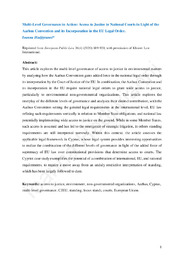Multi-Level Governance in Action: Access to Justice in National Courts in Light of the Aarhus Convention and its Incorporation in the EU Legal Order

View/
Date
2020Publisher
European Public LawVolume
26Issue
4Pages
889-920Google Scholar check
Keyword(s):
Metadata
Show full item recordAbstract
This article explores the multi-level governance of access to justice in environmental matters by analysing how the Aarhus Convention gains added force in the national legal order through its interpretation by the Court of Justice of the EU. In combination, the Aarhus Convention and its incorporation in the EU require national legal orders to grant wide access to justice, particularly to environmental non-governmental organizations. This article explores the interplay of the different levels of governance and analyzes their distinct contribution, with the Aarhus Convention setting the general legal requirements at the international level, EU law refining such requirements vertically in relation to Member State obligations, and national law potentially implementing wide access to justice on the ground. While in some Member States, such access is assumed and has led to the emergence of strategic litigation, in others standing requirements are still interpreted narrowly. Within this context, the article assesses the applicable legal framework in Cyprus, whose legal system provides interesting opportunities to realize the combination of the different levels of governance in light of the added force of supremacy of EU law over constitutional provisions that determine access to courts. The Cypriot case study exemplifies the potential of a combination of international, EU, and national requirements, to require a move away from an unduly restrictive interpretation of standing, which has been largely followed to date.
